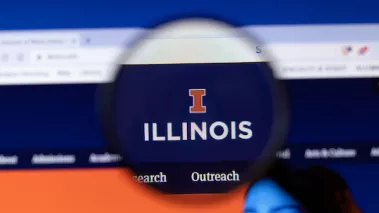Table of Contents
University of Illinois insists forcing faculty to promote DEI against their will doesn’t threaten academic freedom

Postmodern Studio / Shutterstock.com
In response to a letter from FIRE, University of Illinois Urbana-Champaign said its new faculty tenure and promotion policy “protects academic freedom.” FIRE's not convinced.
The University of Illinois at Urbana-Champaign is the latest college or university forcing faculty to promote the administration’s DEI views — or else.
Last month, FIRE wrote to UIUC calling on the administration to eliminate or revise its Promotion and Tenure policy, which requires faculty, following the 2024–25 academic year, to “provide (in one page or less), a personal statement detailing their specific individual and/or collaborative activities aimed at supporting diversity, equity, and inclusion [DEI] . . . includ[ing] a discussion of the context, importance, and impact of their contributions along with their future plans for contributions.”
A faculty member’s DEI activities and personal statement about their importance and impact will subsequently be considered in an evaluation of that faculty member’s teaching, service, and research.
When policies threaten academic freedom, FIRE will intervene, regardless of the political or ideological motivations behind the threats.
To support its position, the university provided a guiding document on its website that explains its interpretation of DEI and lists examples of activities that would meet this new requirement. All of the examples provided by the university reinforce the idea that only activities aligning with university-approved ideological beliefs and views on DEI are considered acceptable. Acceptable examples include: “A classics professor participates in an anti-racist curriculum discussion group,” and “A group of faculty works with the local refugee welcome center to establish a project with an effort to support recently arrived refugees learn to start businesses in the community.”
But as a public university, UIUC cannot condition promotion and tenure on adherence to administrators’ ideological views. Instead, it is obligated to allow faculty to dissent from majority opinions on issues of public or academic concern — and to otherwise exercise their academic freedom in pursuing teaching, research, and service activities — without suffering diminished career prospects.
As explained in our letter:
FIRE would not object to UIUC recognizing faculty members’ voluntarily chosen and relevant teaching, research, and service activities and accomplishments that might happen to be characterized as DEI contributions. But even if the new DEI requirement will give faculty some leeway in choosing activities to fulfill it, the requirement will still threaten their academic freedom. It will coerce faculty whose academic interests may lie elsewhere — but who wish to maximize their chances of obtaining tenure or promotion — to substantially reorient their scholarly pursuits or service activities to conform with UIUC ideological preferences and help fulfill social goals the university deems desirable.
After not receiving an initial response from UIUC, FIRE followed up on Oct. 11, reiterating that the university must not punish with diminished career prospects faculty who refuse to make a forced commitment to a prescribed set of ideological views. The next day, UIUC responded, claiming the policy “protects academic freedom, encourages unrestricted scholarly exploration, and creates an environment that encourages open inquiry and learning.”
That’s great. However, its new policy says the very opposite. Accordingly, FIRE remains concerned.
As a public university, UIUC cannot condition promotion and tenure on adherence to administrators’ ideological views.
As these kinds of cases spike at colleges and universities nationwide, we hope universities like UIUC will remember that our nation is only a few decades removed from 1950s-era McCarthyism, when faculty were forced to disavow communist ideologies to remain in step with popular views at the time. While today’s college administrators may feel their mission is more noble, the principles at work are exactly the same. We trust universities would recognize the issue with evaluating faculty based on affirmation of the importance of “patriotism,” “racial colorblindness,” or “individualism,” or their demonstration of activities that promote these ideas. In short, no matter the views, colleges cannot force faculty to pledge allegiance to them.
When policies threaten academic freedom, FIRE will intervene, regardless of the political or ideological motivations behind the threats. We will continue to do so here.
If you are a university or college looking to implement a new DEI policy, or are just curious about the legitimacy of a current policy, feel free to reach out to FIRE or check out our statement on the use of DEI criteria in faculty hiring and evaluation. We are here to help and happy to do so!
FIRE defends the rights of students and faculty members — no matter their views — at public and private universities and colleges in the United States. If you are a student or a faculty member facing investigation or punishment for your speech, submit your case to FIRE today. If you’re faculty member at a public college or university, call the Faculty Legal Defense Fund 24-hour hotline at 254-500-FLDF (3533).
Recent Articles
FIRE’s award-winning Newsdesk covers the free speech news you need to stay informed.

O holy fight: New Hampshire Satanic Temple statue threatened by more than vandals

California and other states are rushing to regulate AI. This is what they’re missing

One day after FIRE lawsuit, Congress passes changes to filming permits in national parks


